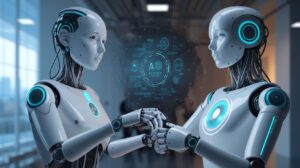Artificial Intelligence (AI) is rapidly transforming the world around us—from personalized recommendations on Netflix and social media to virtual assistants like Siri and Alexa. But what exactly is AI, and why is it such a big deal across industries? Whether you’re curious about the tech behind your favorite apps or interested in how AI is reshaping the future, this guide breaks down everything you need to know. We’ll explain the basics of AI, explore real-world applications, and dive into what the future holds. By the end, you’ll not only understand AI but also how it’s impacting your life and how you can stay ahead in this fast-evolving field.
Table of Contents

What Is Artificial Intelligence?
Artificial Intelligence refers to machines designed to mimic human intelligence, performing tasks like learning, problem-solving, and decision-making. AI can be categorized into two primary types:
1. Narrow AI: Systems designed for specific tasks, such as voice recognition or playing chess.
2. General AI: Hypothetical systems capable of performing any intellectual task a human can do.
Understanding these types is crucial to dispel myths, like AI having emotions or the ability to fully replace human cognition.
A Brief History of Artificial Intelligence
AI’s journey began in the 1950s when Alan Turing posed the famous question, “Can machines think?” The Turing Test became a key benchmark for evaluating a machine’s ability to exhibit intelligent behavior. Major milestones include:
- 1956: The Dartmouth Conference marks the birth of AI as an academic field.
- 1997: IBM’s Deep Blue defeats world chess champion Garry Kasparov.
- 2011: IBM’s Watson wins “Jeopardy!” against human champions.

These milestones showcase AI’s rapid evolution and its growing impact on our world.
How Artificial Intelligence Works
Artificial Intelligence (AI) operates through a combination of cutting-edge technologies that empower machines to learn from experience, adapt to new inputs, and perform tasks that typically require human intelligence. Here’s how AI works at its core:
- Machine Learning (ML): This foundational AI technology uses sophisticated algorithms that enable systems to learn and improve from data without being explicitly programmed. For example, ML powers personalized recommendations on streaming platforms and detects fraudulent transactions in banking.
- Deep Learning: A specialized form of machine learning, deep learning employs artificial neural networks inspired by the human brain. It processes vast amounts of complex data, making it essential for applications like voice recognition in virtual assistants and image analysis in medical diagnostics.
- Data Training: AI systems require extensive datasets to recognize patterns and make accurate predictions. By feeding large volumes of data into these models, AI can learn to identify trends, solve problems, and make decisions—whether it’s suggesting the best route for your commute or analyzing financial market shifts.

Technologies like natural language processing (used in Siri and Alexa) and computer vision (key for self-driving cars) highlight AI in everyday applications.
Types of AI Technologies
AI technologies vary in complexity and functionality:
- Reactive Machines: Basic AI systems that respond to specific inputs (e.g., IBM’s Deep Blue).
- Limited Memory AI: Systems that learn from historical data, like self-driving cars.
- Theory of Mind AI: Hypothetical AI that understands human emotions and intentions.
- Self-Aware AI: A futuristic concept where machines possess consciousness, often explored in science fiction.
Real-World Applications of AI
AI is revolutionizing industries and transforming everyday life:

- Healthcare: AI aids in diagnosing diseases, developing personalized treatment plans, and even robotic surgeries.
- Finance: AI-driven fraud detection and algorithmic trading improve security and efficiency.
- Transportation: Autonomous vehicles are changing how we move, making transportation safer and more efficient.
- Entertainment: AI powers recommendation engines for platforms like Netflix and Spotify.
- Daily Life: Smart home devices, from thermostats to virtual assistants, streamline everyday tasks.
Ethical Challenges in AI
As AI becomes more integrated into society, ethical considerations are critical:
- Bias and Fairness: AI systems can unintentionally perpetuate biases if not carefully managed.
- Privacy Concerns: AI’s reliance on large datasets raises significant privacy issues.
- Job Displacement: Automation may lead to job losses in various industries, affecting economic stability.

Developing ethical guidelines and responsible AI practices is essential to mitigate these challenges.
If you’re looking for an alternative, you might consider linking to a timeline from a highly authoritative academic source like Stanford University’s AI timeline or the MIT Technology Review AI history section.
The Future of Artificial Intelligence
The future of Artificial Intelligence is poised to revolutionize industries and enhance daily life in ways we are only beginning to imagine. Here’s what’s on the horizon:
- Human-AI Collaboration: Imagine a workplace where AI handles repetitive tasks, freeing up humans to focus on creative, strategic, and high-impact work. From AI-assisted design in architecture to AI-enhanced diagnostics in healthcare, this collaboration will drive productivity to new heights.
- Technological Advancements: Cutting-edge innovations like quantum computing, enhanced natural language processing, and more sophisticated machine learning algorithms are set to push AI capabilities far beyond current limitations. These breakthroughs will fuel new products, services, and efficiencies across sectors like finance, transportation, and entertainment.
- Ethical Vigilance: As AI continues to evolve, ensuring it serves society equitably becomes paramount. Policies focusing on transparency, fairness, and accountability will be crucial in addressing issues like data privacy, bias, and job displacement.
Balancing these innovations with a strong ethical framework will be essential to ensure AI’s positive and transformative impact on society, particularly in the rapidly evolving U.S. tech landscape.
Stay updated on AI’s future trends by visiting AI Trends.
Conclusion
Understanding artificial intelligence is more than just grasping a technological concept—it’s about recognizing how this transformative tool is shaping our world. From its historical milestones to its real-world applications, AI is at the forefront of innovation, influencing industries and our daily lives. As you reflect on what you’ve learned, consider how AI could play a role in your personal or professional journey.
The conversation doesn’t stop here! We’d love to hear your thoughts on AI. What excites you the most? What ethical challenges do you think we should tackle next? Share your insights in the comments below or explore more about AI on reputable sources like MIT Technology Review for the latest developments.
For in-depth articles and updates on AI and technology trends, subscribe to our newsletter and stay ahead of the curve. Embrace AI’s potential while staying mindful of its challenges—that’s the key to navigating the future. Let’s explore this fascinating journey together! [techGeniuxio.com]
Additional Resources for Learning About AI
Courses: Stanford’
Books: “Artificial Intelligence: A Modern Approach” by Stuart Russell and Peter Norvig.





